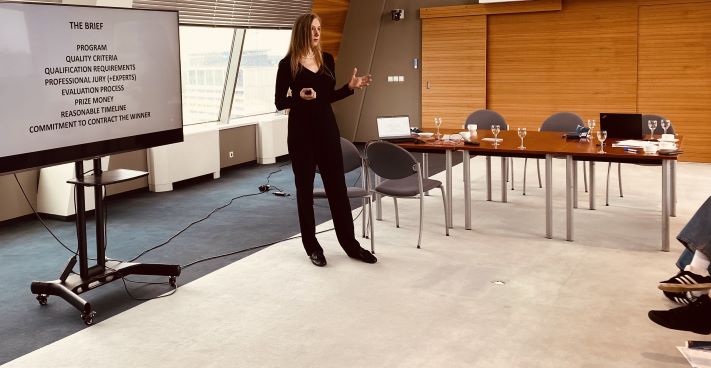Expert missions
The expert mission is a targeted, once-off version of mentoring. It involves two participants who are at roughly the same level, but with one needing expert advice on a very precise, often technical topic. With a little preparation on a specific topic, a study visit is at the heart of this activity.
This form or mentoring was developed and is used in the Covenant of Mayors, where Eurocities acts as secretariat.
Method
- Call for best practices: Initiate by reaching out to strong cities to share their best practices.
- Identifying learners: A subsequent call is made cities that have specific learning objectives aligned with these best practices.
- Initial online interaction: An initial online discussion facilitates the introduction of the participants to each other. This helps in refining and focusing the exchange’s objectives.
- Physical visit: This involves the representative(s) of the learner city visiting the mentor city to observe and understand the best practices in action.
- Post-visit roadmap: Once the physical visit concludes, mentees draft a roadmap. This document captures:
- Learning objectives.
- Observed best practices.
- An assessment of the feasibility of replicating the observed best practices in the mentee’s local context.
- Replicability assessment: This analysis is primarily for the learner city, though the mentor city also provides an assessment. It delves into:
- Governance structures required.
- Financing options.
- Potential challenges and barriers.
- Preliminary steps for implementation.
- Final online discussion: A concluding online meeting facilitates a discussion on the roadmap and the replicability assessment, offering a platform for further clarifications and decisions.
Operational considerations:
For organisers orchestrating the expert mission, approximately 10 full-time working days are needed to ensure the smooth execution and completion of the visit.
The expert mission methodology emphasises a hands-on approach to knowledge transfer, ensuring learner cities not only understand best practices but also assess their feasibility and adaptation in their contexts.
Top tips
- Define objectives: Clearly articulate the learning objectives and the specific technical topic of focus to ensure that both participants are aligned and the session is productive.
- Ensure mutual benefit: Strive to make the mission advantageous for both mentor and mentee by incorporating elements like capitalisation sessions that allow reciprocal learning, thereby encouraging engagement from expert cities.
- Invest in proper matching: Spend ample time in the application process to find the right match between mentor and mentee cities, focusing on the alignment of needs, interests, and expertise to maximise the impact of the mission.
- Follow up: After the visit, ensure that both cities reflect on the lessons, assess replicability of good practices, and discuss the roadmap in detail during the final online meeting to solidify the gains from the mission.
Pros & cons
The focused and truncated nature of this form of mentoring allows for a very technical and targeted exchange. However, it is also necessarily less broad and holistic, and less likely to develop into a longer-term relationship between cities. It also makes it more difficult to recruit expert cities as the restricted and one-directional structure means that they can expect fewer of the benefits that usually fall to strong cities engaged in mentoring.
Outcomes and impact
An expert mission is intended to result in the transfer of knowledge and experience between a mentor and mentee city through a targeted approach.
The outcome should result in the weaker participant being able to make concrete progress in a very specific area. In the context of Covenant of Mayors, where the practice was developed, it allows cities to exchange on climate neutrality strategy and supports cities in implementing their Covenant Action Plan, for example through learning better approaches to sustainable building renovation.
Impact
Here good examples of actual best practices that have been implemented in cities as a result of expert missions.
Pitfalls
The application process is challenging, in particular when it comes to finding a mentor city. For this reason, it is more manageable to have a two stage application process, starting with the call for mentors with good practices and then finding mentees that can make use of the expertise that is available.
As with the Twinning, one-on-one works well if the match is appropriate and participants are engaged. As mentioned above, the limited scope of the exchange means that there are less advantages for mentors, so in Covenant of Mayors, Eurocities added a ‘capitalisation session’ to offer a learning opportunity for the expert city, based on a topic of their choice from the learner city.
Links


